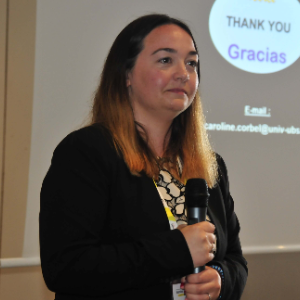Title : Tamoxifen : Not only a breast cancer drug but also a putative neurodegenerative disorder treatment ?
Abstract:
Cyclin-dependent kinase 5 (CDK5) is a multifunctional enzyme that plays numerous roles, notably in brain development. CDK5 is activated through its association with the specific activators, p35 and p39. Proteolytic procession of the N-terminal part of its activators has been linked to Alzheimer’s disease and various other neuropathies. The interaction with the proteolytic cytoplasmic product p25, in comparison with the membrane protein p35, hyper-activates CDK5 and modifies its substrate phosphorylation state. In order to discover smallmolecule inhibitors of the interaction between CDK5 and p25, we have used a bioluminescence resonance energy transfer (BRET)-based screening assay. Among the 1,760 compounds screened, the generic drug tamoxifen has been identified. Tamoxifen is on the market for nearly 35 years and the most-prescribed medication to treat breast cancer. In this work, inhibition of the CDK5 activity by tamoxifen was notably validated by monitoring the phosphorylation state of one of its target prtein, tau, involved in neurodegenerative diseases. This could be explained by the fact that tamoxifen interacts with p25 to avoid the CDK5/p25 interaction. Such studies pave the way for treatments of tauopathies.
Audience take away:
• The protein kinase studied here is CDK5 (Cyclin Dependent Kinase 5). This protein is ubiquitously expressed and involved in many pathological processes such as neurodegenerative diseases and pancreatic, lung, prostate cancers… The specific inhibition of CDK5 is a new challenging prospect and the key to the development of therapeutic solutions.
• One of the techniques used is the BRET (Bioluminescence Resonance Energy Transfer)-based high through put screening assay, we developed for the first time in yeast, allowing the discovery of protein-protein interaction inhibitors. An important advantage of this method is the possibility to screen small molecules against nonpreformed protein complexes.
• The experiments conducted are complementary: in silico, in vitro, in levuro and ex vivo studies have been performed and will be presented




